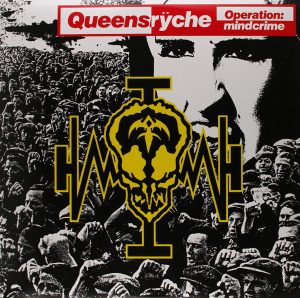 I first saw Queensrÿche way back in 1986, on their Rage for Order tour. They were supporting AC/DC on their Who Made Who tour, and that’s who we were really there to see. Queensrÿche’s self-titled debut EP blew my friends and I away in 1983, with catchy NWOBHM songwriting and a singer who could hit some crazy notes. But their first two full-length albums, The Warning and Rage for Order, did nothing for us at a time when we were listening to albums from the likes of Metallica, Iron Maiden, Judas Priest, and, in a soon-to-be guilty manner, Bon Jovi. There was too much going on in those Queensrÿche records, and it seemed like the band were in over their heads. Inaccessible was their theme, and while they sounded good in concert (and Scott Rockenfield’s chain-link drumkit looked pretty cool), it wasn’t enough to sway us. Until two years later, when a: we were adults, and b: Operation: mindcrime dropped on us.
I first saw Queensrÿche way back in 1986, on their Rage for Order tour. They were supporting AC/DC on their Who Made Who tour, and that’s who we were really there to see. Queensrÿche’s self-titled debut EP blew my friends and I away in 1983, with catchy NWOBHM songwriting and a singer who could hit some crazy notes. But their first two full-length albums, The Warning and Rage for Order, did nothing for us at a time when we were listening to albums from the likes of Metallica, Iron Maiden, Judas Priest, and, in a soon-to-be guilty manner, Bon Jovi. There was too much going on in those Queensrÿche records, and it seemed like the band were in over their heads. Inaccessible was their theme, and while they sounded good in concert (and Scott Rockenfield’s chain-link drumkit looked pretty cool), it wasn’t enough to sway us. Until two years later, when a: we were adults, and b: Operation: mindcrime dropped on us.
For those who have only listened to metal since 1995, or for those who never thought Queensrÿche worthy of checking out, Operation: mindcrime is a concept album which tells the story of a drug addict who becomes an assassin for a political extremist group, but has a change of heart when he falls in love with a former prostitute who has become a nun. That sentence doesn’t do the story justice, though, as the 59-minute album contains a number of twists, turns, and surprises that make it a truly compelling story – one of the best ever, in fact. Murder, suicide, drugs, sex, political agendas, and an overarching theme of control and corruption permeate the album. It’s also one of the few albums in my collection of over 5,000 that I would give a perfect score to, and therefore you all need to listen to it.
From the opening narrative of “I Remember Now” we know something special is happening. We are directly immersed in the story right away, and the two brief intro tracks serve to set the stage for an amazing run of songs – and that’s key to this progressive metal opus: the songs really are songs. There’s a ton of technical ability on display, as we’d expect, but never at the expense of the songs. That’s why it’s so easy for the anthemic “The Mission,” The epic “Suite Sister Mary,” with Pamela Moore on vocals, or the catchy “Breaking the Silence” and “I Don’t Believe in Love” to stick in our minds, in my case for thirty years now. The arrangement of each song, and the album in its entirety, is so spot-on that you can’t stop listening once you start. And the handful of short narratives and segues? All done with zero cheese factor, pushing the story along as it needs to be, to the album’s climax, one of the best songs Queensrÿche ever wrote, “Eyes of a Stranger.”

Thirty years later, the only thing I would change about this album is the snare drum sound and accompanying reverb, but hey, back then effects were actually used on albums, and drums had a lot of reverb. One thing albums in those days also had was a little thing called dynamics, and the DR12 score we are graced with (even on my original CD from 1990) is heaven on the ears. Peter Collins (Rush, Gary Moore) produced the album and truly captured lightning in a bottle, pushing the band beyond anything their first two albums hinted at, with Jimbo Barton crafting an impeccable mix. Orchestral arrangements from the legendary Michael Kamen bring a depth to Operation: mindcrime that most bands can only dream of. In short, the record sounds amazing.
It can be easy to lose track of great albums as we get older and newer material makes its way onto our playlists. But Operation: mindcrime has managed to maintain its place as one of my five favorite albums of all time, a record that, when the final album mashup comes to a stunning crescendo and Nikki ends it with “I remember now,” I still get chills. In fact, it’s the best progressive metal concept album of all time. If you’ve never listened to Operation: mindcrime, do yourself a favor and sit down with it for an hour, and if (as you should) you already own it, go listen again.

















